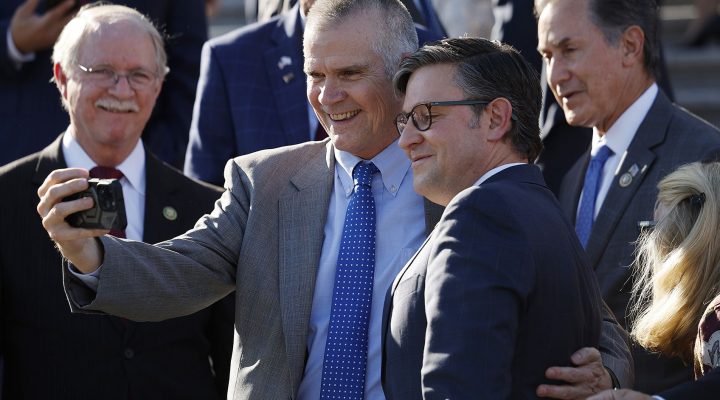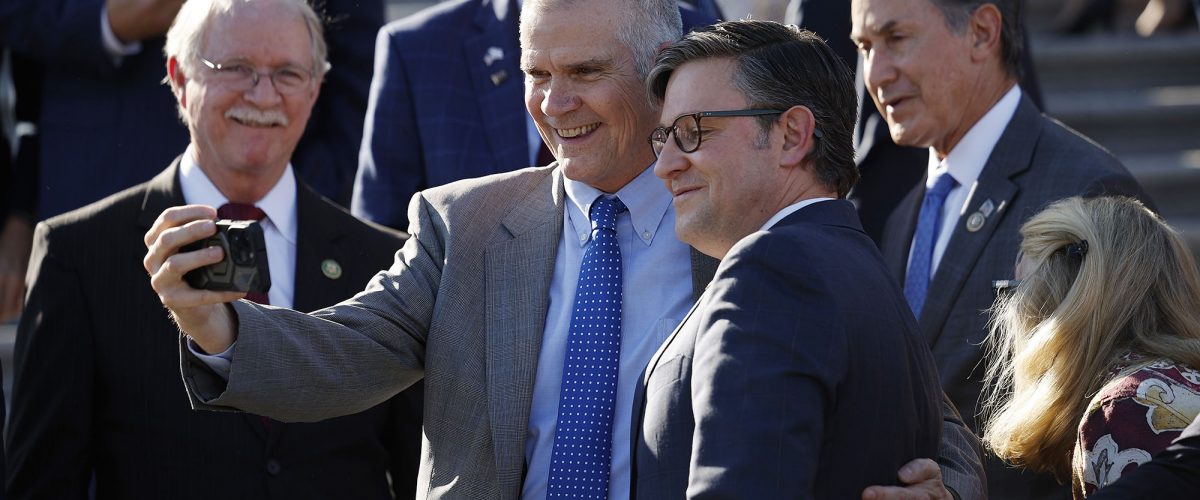“I don’t believe there are any coincidences in a manner like this. I believe that Scripture, the Bible, is very clear that God is the one that raises up those in authority. He raised up each of you, all of us, and I believe that God has ordained and allowed each one of us to be brought here for this specific moment in this time. This is my belief.”
These words marked the crescendo in Rep. Mike Johnson’s acceptance speech last week after being elected speaker of the House, a vote that put him second in the line of succession to the presidency. (Digression: I’m not going to unpack the implications of this questionable and inconsistent theology at length, but I can’t resist this question: Doesn’t such a theology necessarily also imply that God raised up Joe Biden in authority and ordained and allowed him to be brought to the presidency for this specific moment in time? Or does God only raise up Republicans?)
Just before the vote that elected him speaker, Johnson posted on social media the following photo of the inscription carved over the rostrum in the House of Representatives.
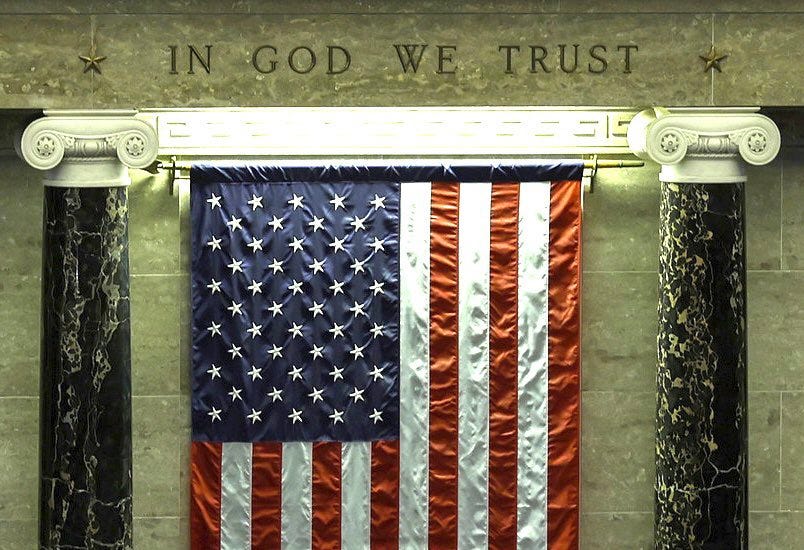
Similarly, ahead of the vote, Johnson’s ally Rep. Greg Steube also posted the photo below depicting Johnson kneeling in prayer on the House floor, declaring, “Mike Johnson is a strong conservative, but above all else, he is a strong Christian. He’s not afraid to look to his faith for guidance. America needs that more than ever in the U.S. House. I look forward to voting for Mike Johnson as our next speaker.”
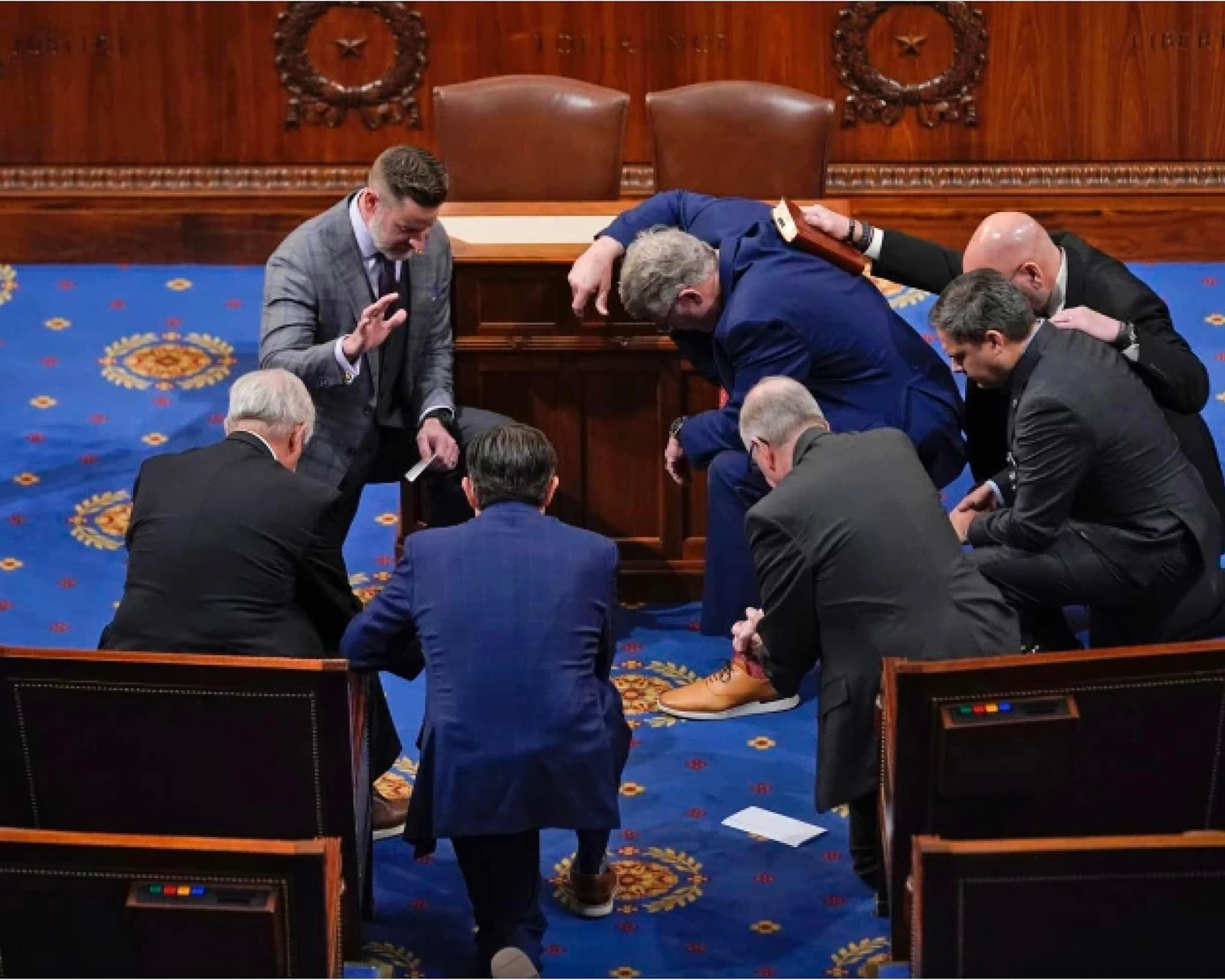
This photo currently circulating on social media is not from this week but from January. U.S. Rep. Greg Steube posted it on Facebook with this description: “In January, @RepMikeJohnson joined me on the House floor while we were in a deadlock over who our next Speaker would be. We lifted up the speaker’s race to the Lord and asked for his divine guidance. Immediately after the prayer, 14 members changed their votes, ultimately leading to Speaker McCarthy securing the gavel by the end of the day.”
The election of Johnson as speaker carries implications far beyond the House of Representatives. Johnson’s elevation is one more confirmation that the Republican Party — a party that is 68% white and Christian in a country that is 42% white and Christian — has fully embraced its role as the party of white Christian nationalism.
While Johnson is more polished than other right-wing leaders of the GOP who support this worldview (such as U.S. Rep. Marjorie Taylor Green’s overt declaration that “we should be Christian nationalists”), his record and previous public statements indicate he’s a textbook example of white Christian nationalism — the belief that God intended America to be a new promised land for European Christians. He’s the embodiment of white Christian nationalism in a tailored suit.
Johnson has praised the evangelical historical revisionist David Barton, who promotes the idea that America was founded as a Christian nation and that its laws should be based on a white evangelical Christian interpretation of the Bible. Johnson stated publicly that Barton, who has no credentials as a historian, had “a profound influence on me, and my work, and my life and everything I do.”
“The not-so-subtle implication was that if there were illegitimate voters, they were voters of color.”
Despite the warm persona and frequent God talk, it’s clear Johnson’s ideal America has white supremacy and Christian dominion as its supporting pillars. For example, the efforts to challenge the results of the 2020 presidential election, which Johnson actively supported, were dripping with racism; the allegations of voting anomalies overwhelmingly targeted districts in which large numbers of Black and Latino voters supported Joe Biden. The not-so-subtle implication was that if there were illegitimate voters, they were voters of color.
His remarks about immigrants also have been disturbing. In his acceptance speech, he linked false allegations of unrestricted immigration at the southern border with the deaths of Americans by illegal drugs: “From Texas to New York, wave after wave of illegal migrants are stressing our communities to their breaking points. We know that our streets are being flooded with fentanyl and all of our communities, children and even adults are dying from it.”
Johnson has repeatedly promoted the “Great Replacement Theory,” the idea that Democrats are recruiting immigrants to replace American voters. This racist assertion trades on broader fears that immigrants are invading the country and threatening American culture, a view held today by 61% of white evangelicals and 65% of Republicans.
Johnson has gone so far as to accuse Democrats of aiming for the “destruction of our country at the expense of our own people.” One only has to interrogate the phrases “our country” and “our own people” to understand who Johnson believes are real Americans.
These statements trade in old and dangerous white supremacist tropes. And Johnson continues a long American tradition of attempting to cover jagged white supremacist sentiments with a shiny veneer of Christian platitudes.
“Johnson continues a long American tradition of attempting to cover jagged white supremacist sentiments with a shiny veneer of Christian platitudes.”
In his first public interview, tellingly with Sean Hannity of Fox News, he called himself a “Bible-believing Christian” and said anyone who wanted to understand his worldview could just “pick up a Bible off your shelf and read it.”
Never mind that the vast majority of Black and Latino Christians, whose Bibles are presumably not gathering dust on their shelves, have come away from their Scripture reading with radically different conclusions on, well, just about everything. To take just two of Johnson’s favorite issues, most Americans — and even most American Christians — disagree with his extreme views on banning abortion and same-sex marriage. It’s an astonishing act of white hubris to make such a monopolistic claim about a sacred text, especially in the face of demonstrable counter evidence.
Johnson’s elevation to speaker also gives us insight about the relative importance of cultural versus economic issues in today’s Republican Party. In PRRI’s most recent American Values Survey, released last week in partnership with the Brookings Institution, we asked explicitly about whether Americans wanted a president who could best manage the economy or a president who would protect and preserve American culture and way of life. The country is divided on this question, with 51% preferring the first option and 46% preferring the second.
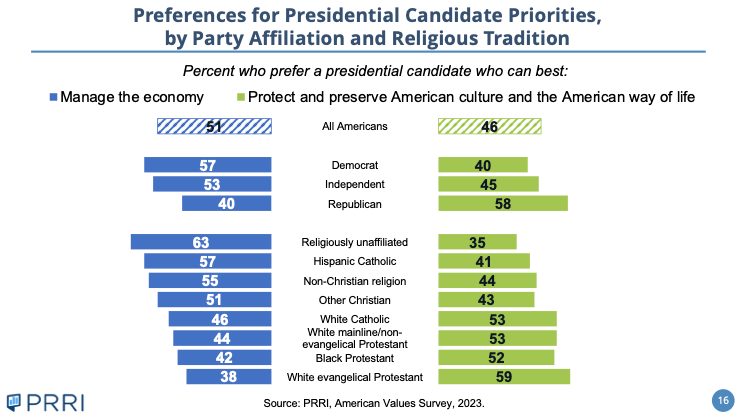
Our two political parties, however, are mirror opposites of one another. Nearly six in 10 Democrats (57%) say they prefer a presidential candidate who can best manage the economy, but nearly six in 10 Republicans (58%) say they prefer a presidential candidate who can protect and preserve American culture and way of life.
The voting motivations of Democrats might still come down to the mantra, “It’s the economy, stupid.” But, for Republicans, both the data and the party’s selection as speaker indicate their central concerns today are emanating not from economic anxiety but from a desperate attempt to preserve their vision of America as a white Christian country.
“Their central concerns today are emanating not from economic anxiety but from a desperate attempt to preserve their vision of America as a white Christian country.”
Perhaps the most dangerous implication of the ascendancy of white Christian nationalism among the Republican Party is that it is fundamentally antidemocratic. This worldview is not committed to democracy and certainly not to a pluralistic, multi-racial, multi-religious democracy.
According to PRRI’s American Values Survey, conducted in partnership with the Brookings Institution, a majority of Republicans (52%) and white evangelicals (54%) today believe America was designed by God to be a promised land for European Christians. And among those who hold that view, four in 10 (39%) believe things have gotten so far off track that true American patriots may have to resort to violence to save the country.
If we are to understand what happened on January 6, the maneuvering that will likely happen under Johnson’s gavel and the inevitable attempts to undermine free and fair voting in 2024, we must realize white Christian nationalists are not a fringe movement but one that has now fully seized control of one of our two political parties. And we must grasp that they are dedicated not to a fair process, but to a predetermined — indeed predestined — outcome, one that corresponds to their self-serving interpretation of the Bible and American history.
Robert P. Jones serves as president and founder of PRRI and is the author of The Hidden Roots of White Supremacy and the Path to a Shared American Future and White Too Long: The Legacy of White Supremacy in American Christianity, which won a 2021 American Book Award.
This column originally appeared on Robert P. Jones’s substack #WhiteTooLong.
Related articles:
New speaker of the House once led never-opened Paul Pressler School of Law
Johnson called ‘the most unabashedly Christian nationalist speaker in history’

